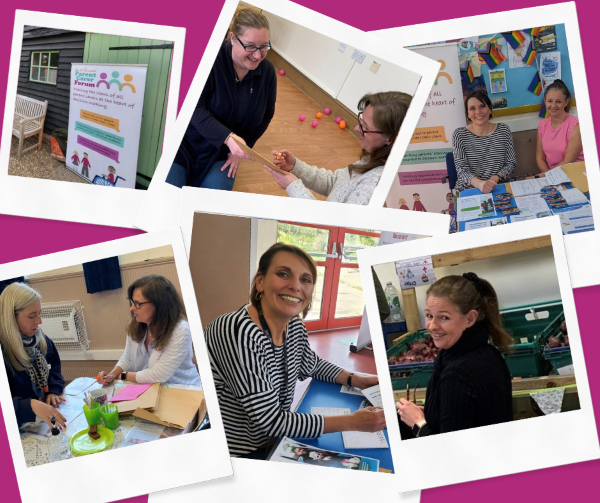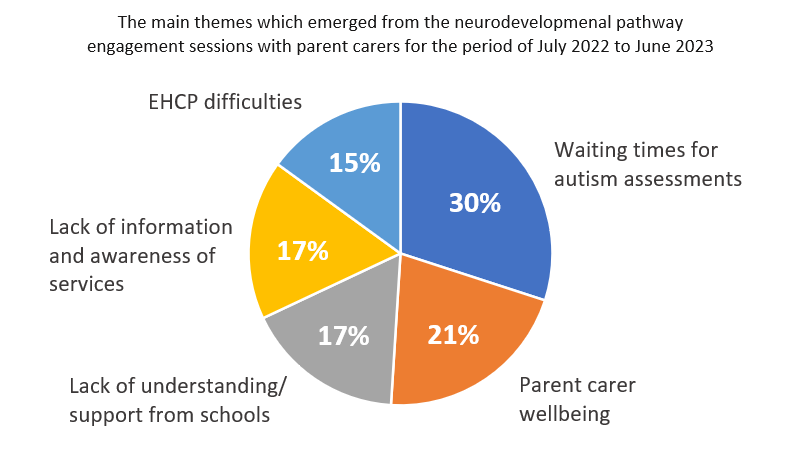ESPCF has published a report detailing our work hearing from parent carers about the challenges faced and support needed if their child or young person is on the neurodevelopmental pathway.
Click here to read NDP report (PDF)
Over the year of July 2022 to June 2023, Karen and Serene, (ESPCF engagement workers, pictured below), visited 44 venues and spoke to 251 people (186 parent carers and 65 practitioners) about their experiences of the neurodevelopmental pathway. They were able to have some in-depth conversations, to get a really thorough picture of what families have been going through and what would have helped them along the way.

The ‘pathway’ is the different steps of the process from when something is first flagged right through to post-diagnosis support. It also includes those children and young people who are assessed but do not get a diagnosis.
Neurodevelopmental conditions included in the pathway are: autism, ADHD, foetal alcohol spectrum disorder (FASD), learning disabilities / developmental delay, social communication concerns, sensory processing disorders, tics/Tourette Syndrome.

The numbers here refer to the issue reported to be most important to each parent carer we spoke to. It is important to note that there is considerable overlap between the themes.
It should also be noted that as we attended multiple ‘Small Beginnings’ sessions at family hubs, a significant number of parent carers we spoke to have children who are pre-school age. We are collating our wider feedback across all sources and hope to publish a broader report in early 2024.
Our recommendations for change
Waiting times for autism assessments
- Families need to be kept in the loop during the long waiting period.
- Readily available access to information and signposting.
- Schools need to make sure there is clear and helpful information on the support available for those with additional needs, whether a child has a diagnosis or not.
Parent carer wellbeing
- Recognising that while caring for a child or young person with SEND (special educational needs & disabilities) may bring its challenges, it is the system that wears parent carers down.
- The urgent need for overnight respite provision still needs to be resolved.
- Proper recognition and funding for experts by experience.
Lack of information/awareness of services
- Readily available, straightforward, and basic guidance and information in all nurseries and for all childminders.
- More work to find out from parent carers what would help them find the information they need when searching the Local Offer website.
- Practitioners who have contact with SEND families to have basic knowledge (as a minimum) on where parent carers can access information.
- Support for families and carers less able to navigate and access SEND provision.
Lack of understanding/support from schools
- Teachers who take on the SENCO role need to have completed initial training on SEND before they take on the role and should be required to start the qualification within (say) three months of taking up the role.
- SENCOs need to have the skills and the authority to train and/disseminate good practice to other school staff.
- SENCOs need to be given the time to complete the requirements of the role and schools need to value their SENCOs – ideally, they should have a position within the Senior Leadership Team.
- Schools need to operate with a firm but fair behaviour policy, where there is flexibility and consideration of reasonable adjustments.
- There needs to be improved training and understanding within education providing a ‘whole school approach’ towards children and young people who have additional needs.
EHCP difficulties
- Changes need to happen more quickly – lost years in childhood cannot be recouped.
- The system needs to be less complex, but in the meantime parent carers need help to understand the process. It would help if SENCOs had consistent information and experience of how to apply for EHCPs.
- Improved transparency and accountability. This includes complaints that don’t appear to go anywhere or change practice/make any positive difference.
The information gathered as part of this work, and this report, are used to coproduce the Neurodevelopmental Pathway (NDP) Family and Training and Navigation Service run by Amaze as well as continuing to inform the representations we make across a range of different work we are involved in. This includes work looking to improve neurodevelopmental referral, assessment and support processes, as well as work around mental health in education, trying to improve school support and EHCP experiences, and reiterating the need for increased respite.
The report has also been shared directly with the NHS commissioner.
